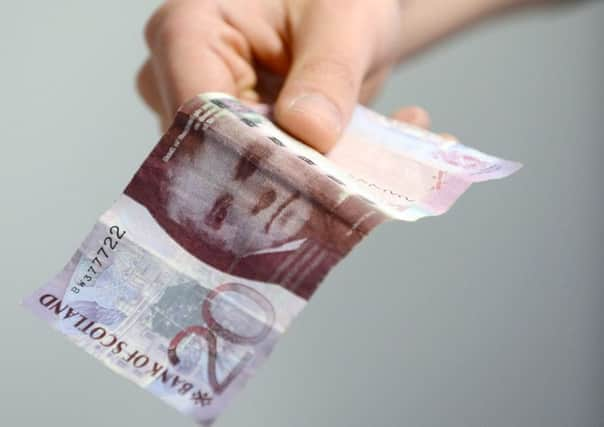Bill Jamieson: Cashless world will erode civil liberties


Picture the scene. You’ve queued at the check-out to pay for a newspaper, a bag of mints and a pack of tissues. All the customers in front have settled by credit card. You’re feeling virtuous because you’ve got cash in hand.
“Sorry”, says the check-out assistant. “We don’t accept cash.”
Advertisement
Hide AdAdvertisement
Hide AdFar-fetched? We’re not far off. We are moving fast towards the end of money – or at least money in the form of folding notes. But there are greater and more troubling repercussions. The end of money – evident for years in the explosive growth of online banking and the use of mobile phones for everyday transactions – could result in the greatest ever invasion of privacy and government control of our lives.
Few seem much concerned about this for now. We’re enjoying the ease and convenience of digital shopping and settling most of our transactions now by the swipe of a plastic card.
This week brought a further tell-tale sign of our changing world. De La Rue, one of the world’s oldest and largest bank note printers, announced it is cutting banknote capacity by a quarter.
The company has been struggling amid a global banknote glut. The move to cut the number of production lines from eight to four follows a slump in profits and a plunge in the shares – down more than half since 2013.
Tough for De La Rue. But is this just another casualty of digital technology that has decimated other industries – why need we lament? Who really wants to go back to the era when transfers between our accounts required a visit to the bank branch? What is more welcome than the ability to make such transfers walking along the street and pressing buttons on a mobile phone? What could be less sinister or threatening to our daily business?
But there is another altogether more profound change underway: a world without messy bank notes and the laborious process of cheque writing – but which could render us vulnerable to the digital swipe of central banks and governments. Indeed government control of our savings and wealth - far greater than any intrusion by HMRC or the VAT inspector – is now technologically possible.
There is evidence all around of the push towards cashless payment. At the same time, the interest rate rewards of holding cash in a bank or building society are now woefully thin. A survey this week shows that more than a fifth (21 per cent) of UK adults with savings are earning below 0.5 per cent or less on their main savings account. With an average savings pot of £8,500, that equates to an annual interest payment of just £43 a year – and that’s before tax.
All this is related to the dilemma faced by governments and central banks in avoiding the permanent onset of deflation – a world in which falling prices work to erode the value of money.
Advertisement
Hide AdAdvertisement
Hide AdThe response has been to slash interest rates to near zero – and more recently to threaten negative interest rates for savers. Investment manager Tim Price has been ringing the alarm bells on the wider consequences of this policy. Writing in his book The War on Cash he reminds us that back in September the Bank of England’s chief economist Andy Haldane suggested that negative interest rates could be necessary to discourage saving and boost spending and domestic demand. Those with bank deposit accounts would not experience an interest rate reward for saving, but a penalty by way of deduction.
The logical conclusion would appear to be the effective abolition of money. But that’s a big leap, surely, from where we are now - why need we be worried?
It’s a trend that leaves many older citizens apprehensive. They like the familiarity of cheques – and the sense of security of having a paper trail for their transactions. But Price is not sounding a lament for the disappearing world of bank notes and cheque books. What worries him is that complete abolition of cash threatens our individual freedoms and rights.
“I’m sure”, he writes, “you’ve noticed this quiet coercion… rewards for using debit and credit cards... closed cashier windows on the underground forcing you to use the machines, raising the contactless payment limit to £30, phone apps that let you digitally transfer money at a push of a button.
“The authorities are associating cash with being old-fashioned, behind the times. They are trying to introduce a social stigma around it and humiliate every ‘poor old sap’ fumbling for change at the supermarket. This is a deliberate ploy to usher in an era of total control over your money and life.”